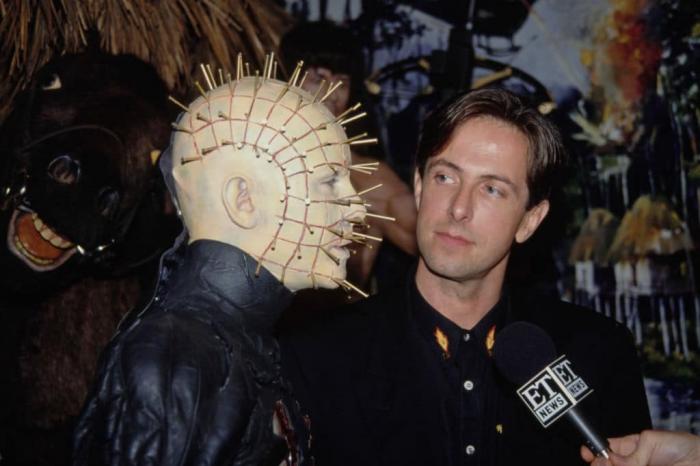
Patricia Cornwell, Clive Barker, Sylvia Day: Pajiba April 2025 Book Recommendations Superpost
By Kayleigh Donaldson | Books | May 5, 2025

Postmortem by Patricia Cornwell
I read a lot of crime fiction and I enjoy a sassy scientist who gets the job done in the face of incompetent cops and smarmy bosses. So, it’s something of a surprise that it’s taken me this long to read me first Kay Scarpetta novel. Patricia Cornwell is widely credited with pioneering this specific genre of crime fiction, one where women are the heroes and the meat of the case solving is done in the lab rather than the field. With the upcoming Amazon series starring Nicole Kidman on the horizon, it only seemed right to give it a go.
As with many books that kickstart a genre or trend, the pioneer is not as polished as its ancestors. Certainly, Postmortem is an enjoyable and speedy read. Scarpetta is prickly and sharp-witted, forever aware that she’s a target for the macho cops and old men’s club who see her as an intruder to their ways of being. She is good at her job but also part of a form of science that is in its early days and remains untrusted by many, including the courts. When a rapist and murderer strikes another target, there seems to be no obvious motive or reasoning behind his apparently random choice of victims. All that connects them is evidence of a sticky residue at each crime scene whose origins are unknown.
This is a remarkably straightforward book. That sounds like a slam but I don’t mean it to. You can see how this novel paves the way for an entire subgenre of crime, one where the plots and twists get even more tangled and dramatic. Postmortem is somewhat more grounded in realism in that the solution to the problem is as it often is in real life: the culprit isn’t embedded in the story for you to uncover from the beginning. He’s just some guy. That does make it a little deflating from a reader’s perspective but not terribly so. This is the start of a crime fiction trend. Where it goes from here is what matters.
Abarat by Clive Barker
Do you know who’s awesome? Clive Barker. He’s one of the undisputed kings of horror, a pioneering figure in fiction whose blend of genres and styles has made him an oft-duplicated but never beaten icon of the form. That and he’s also a really cool dude who doesn’t hate trans people. Imagine that! The wizard TERF should try it some time.
I’m a big Barker fan, and his glorious quote regarding Joanne Von Transphobe reminded me that I hadn’t read his children’s novels. Luckily for me, I had bought a beautiful hardback edition of Abarat during one of my many jaunts to the charity shop. Barker may be best known for his sensual blends of body horror and the surreal but he’s also an excellent fantasy author, and this is another example of that.
The amazingly named Candy Quackenbush hates living in Chickentown, a Minnesota town where the only industry is chicken slaughtering and she has no hope of escaping her abusive home. Things change drastically when a man whose brothers live on the horns on his head asks for her help in calling an ocean to engulf the endless plain and take them to the world of Abarat, an archipelago where every island is a different hour of the day.
Barker’s imagination is unmatched. It’s just amazing to share a space with his mind and the oddities it conjures up. My edition ofAbarat came with over a hundred illustrations created by Barker himself, and that only heightened the reading experience. While this isn’t as out-there as his works for adults - no Cenobites and their kinks here - Barker hasn’t diluted his taste for the dark and unnerving. He clearly trusted his young readers to get on board with his creations, which are often just as grotesque as those seen in something like Weaveworld.
The issue with the book is that it’s clearly one chunk of a wider story and it ends just as the plot is building to something grander. Abarat was intended as a quintet but Barker stopped at three for reasons that have never been clear. What makes this series even stranger is that it was intended to be a challenger to Harry Potter. Seriously, Disney (!?) put down several million dollars for the rights to this series in the hopes that they could capitalize on that wizard’s popularity. If it had succeeded, they wanted to expand into movies, merch, and even theme park attractions. Can we live in the alternate universe where this happened? I feel like we’d all be much happier.
Bared To You by Sylvia Day
I started my writing career, so to speak, in the late 2000s when I began blogging about YA fiction, particularly the splurge of post-Twilight paranormal romances that were largely marketed as ‘what if Edward Cullen was a werewolf/zombie/pixie/etc?’ That means I was also there to witness one of the strangest evolutions in modern publishing: the decision to turn a raunchy human AU Twi-fic into an erotic novel that became one of the biggest sellers of the decade. The utterly unexpected success of 50 Shades of Grey kickstarted another trend: the renewed mainstreaming of erotica in the romance world. Right as SnowqueensIcedragon’s fic became a phenomenon, the established author Sylvia Day’s latest series was given some 50 Shades-esque covers and sold to the same audiences. It also became a huge bestseller.
I avoided reading it at the time because I really hated 50 Shades and had an aversion to ultra-alpha rich brat heroes. But I’m now older, half-wiser, and far less enthused about the current romance trends of romantasy and dark romance. So, when I saw that Day was returning to this series with a new spin-off, I thought I’d check out the book that many of my friends said was ‘the good 50 Shades.’ They weren’t wrong.
Eva Trammel is starting a new job and hoping to carve out a quiet life for herself without the help of her super-rich stepdad. Her work brings her into contact with Gideon Cross, a billionaire businessman who seems instantly enraptured with her. He knows what he wants, even if Eva is less keen to fall hopelessly into his arms, but this is a romance novel so you know what happens next. But also you kinda don’t.
You can see why this book was so frequently compared to 50 Shades and not just because of timing: stoic and controlling rich hero, a penchant for kink, an obviously iffy power dynamic between the central pair. The key difference is that Day, aside from being a far better writer than James, is more nuanced in her handling of her protagonists. Both Eva and Gideon have dark pasts they’re trying to deal with. Eva is a sexual assault victim who wants to deal with her trauma free from her guilt-ridden mother. She’s not a pushover but she’s also conflicted about her emotions regarding this guy who has barged his way into her life. Gideon has a controlling streak but he’s not a monster or a creep. This is a portrayal of two people trying to deal with mutual baggage and be reasonably healthy about it while still figuring out their boundaries.
That makes the book sound hopelessly didactic and it’s not. I can see why some got 50 Shades flashbacks and put it down but it’s amazing what having a genuinely good writer with a sturdy editor on board can do. This thing has an actual plot, a strong narrative flow, and an edge that goes well beyond ‘ooh, whips are naughty, eh?’ There’s a reason that Day’s work has endured while that other author has struggled to find her way forward.



